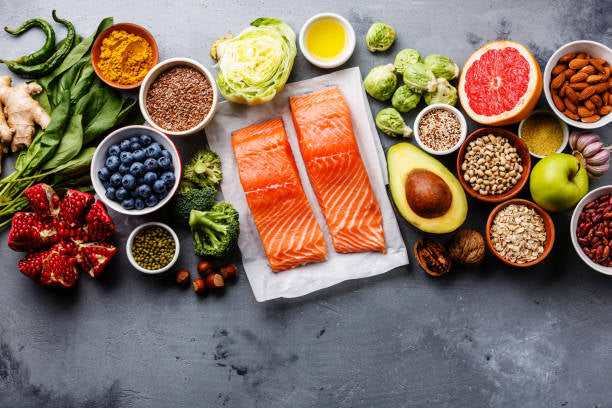Inflammatory Foods
Sugary foods may trigger inflammation by stimulating the production of fatty acids in your liver.
Processed meats like bacon are high in saturated fats, which may cause inflammation.
Your risk of chronic inflammation may be higher depending on your diet — sugar, processed meat, and fried foods can all cause inflammation in your body.
What is inflammation?
Your body uses inflammation to fight off illness and heal injuries. But chronic, long-term inflammation can be dangerous to health.
-
Sugary foods
Foods that are high in sugar like soda and baked goods may trigger inflammation.
Sugar stimulates the production of fatty acids in your liver. When the body digests these fatty acids, the resulting compounds can trigger inflammatory processes.
-
Red meat and processed meats
Processed meats are meats that have been modified through curing, salting, smoking, or adding preserving chemicals.
Some examples of processed meats are:
- Bacon
- Deli meats
- Hot dogs
- Chicken nuggets
Both processed and red meats tend to be high in saturated fat. Studies have found that eating fatty processed and red meats may cause weight gain and inflammation.
-
Some cooking oils
Many common cooking oils contain a type of fat called omega-6 fatty acids. Omega-6 fats aren't necessarily bad — your body uses them for energy and normal growth.
But your omega-6 fats need to be in a careful balance with omega-3 fats that you can get from foods like salmon, mackerel, and flaxseed. If you eat too much omega-6 fat, it can throw off this balance, which some research has found may trigger inflammation, but so far results are mixed, and more studies are needed.
Some common cooking oils that contain omega-6 fats include:
- Corn oil
- Canola oil
- Sunflower oil
- Safflower oil
- Peanut oil
-
Fried foods
Fried foods like chicken nuggets, doughnuts, and French fries may cause inflammation for several reasons, including:
Fried foods tend to have high levels of omega-6 fatty acids.
They often contain trans fats, which can trigger inflammation.
Fried foods produce compounds in the body called advanced glycation end products, also known as AGEs. These compounds directly stimulate inflammation in the body.
-
Refined carbohydrates
Refined carbohydrates are sugars and grains that have been stripped of all bran, fibre, and nutrients.
Studies demonstrate that a diet high in refined carbs may increase inflammation and trigger insulin resistance in the body. These factors contribute to a higher risk of heart disease, obesity, and type 2 diabetes.
Refined carbohydrates are found in foods such as:
- White bread
- Pasta
- Pizza dough
- Sugary cereals
- White rice
- White flour
- Pastries
Note: A diet high in refined carbohydrates can also cause inflammation in the central nervous system.
-
Soda and sweetened drinks
Soda and other sugary drinks may also cause inflammation in three significant ways:
- Drinks sweetened with fructose, glucose and sucrose can affect how your body metabolises sugar, potentially leading to inflammation.
- Soda and other sweetened drinks may cause increased concentration of C-Reactive Protein (CRP), a biomarker associated with inflammation.
- Researchers have found that consuming sucrose-sweetened soft drinks is associated with increased levels of uric acid in the body, which may induce inflammation and insulin resistance.
-
Excessive alcohol
Alcohol in moderation has low-grade inflammatory risks. In excess, however, alcohol can manipulate your body's natural processing, which may lead to dysfunction in organs such as your:
- Brain
- Liver
- Stomach
- Multi-organ interactions
-
MSG
Monosodium glutamate, commonly known as MSG, is a flavour enhancer often added to processed foods.
In studies in mice, this additive was found to increase inflammation and to increase the risk of liver damage, obesity, and some autoimmune disorders.
More research is needed on humans to know if these results are significant for a general population. And it's worth noting that MSG is produced by fermenting natural sources including beets, sugar cane, or molasses.
With that in mind, common foods that contain MSG include:
- Soy sauce
- Canned soup
- Instant ramen
- Condiments
- Potato chips
- Canned vegetables
Processed meats (such as hot dogs, pepperoni, and deli meat)
-
Trans fats
Manufactured trans fats are associated with inflammation in the body. This inflammation can impair gluten tolerance, as well as insulin production.
Though touched on briefly above, it's worth noting that trans fats are in a lot more than just fried foods. Other common foods that contain trans fats include:
- Microwave popcorn
- Frozen pizza
- Non-dairy coffee creamer
- Margarine and other shortening
- Processed pastries
Anti-inflammatory foods
There are also many anti-inflammatory foods that may help fight chronic inflammation in your body. These foods are rich in key compounds like antioxidants and omega-3 fatty acids that may work to reduce your levels of inflammatory proteins.
Some key anti-inflammatory foods to add to your diet include:
- Fatty fish
- Extra-virgin olive oil
- Fruits and veggies like oranges, broccoli, and peppers
- Nuts
- Berries
- Tomatoes
Foods like sugar, packaged snacks, and red meat are associated with higher levels of inflammatory markers, so avoiding them may help you control inflammation and lower your risk of chronic illnesses like heart disease.
But keep in mind that the overall content of your diet is more important than any one meal.




















































